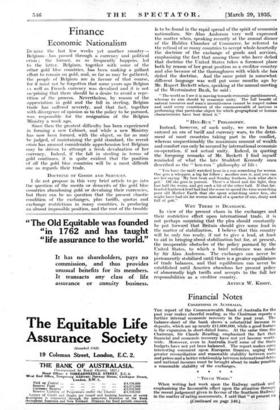Finance
Economic Nationalism
Dram:a the last few weeks yet another cOuntry- Belgium—has passed through a currency and political crisis ; the former, as so frequently happens, led to the latter. Belgium, together with some of the other gold bloc countries, has been making a gallant effort to remain on gold, and, so far as may be gathered, the people of Belgium are in favour of that course, for it must not be forgotten that some years ago Belgian vs well as French currency was devalued and it is not surprising that there should be a desire to avoid a repe- tition of the process. Nevertheless, by reason of the appreciation in gold and the fall in sterling, Belgian trade has suffered severely, and that fact, together with divergence of opinion as to the policy to be pursued, was responsible for the resignation of the Belgian Ministry a week ago.
Since then the greatest difficulty has been experienced in forming a new Cabinet, and while a new Ministry has now been formed, with the object, so far as may be judged, of maintaining the gold standard, the recent crisis has aroused considerable apprehension lest Belgium may be driven to attempt a fresh devaluation of her currency. Indeed, if the fall in sterling in terms of gold continues, it is quite evident that the position of all the gold bloc countries will be a most difficult one as regards their trade.
DOCTRINE OF GOODS AND SERVICES.
I do not propose in this very brief article to go into the question of the merits or demerits of the gold bloc countries abandoning gold or devaluing their currencies, but there can be no question that the present chaotic condition of the exchanges, plus tariffs, quotas and exchange restrictions in many countries, is producing an almost impossible position, and the root of the trouble is to be found in the rapid spread of the spirit of economic nationalism. Sir- Alan Anderson very well expressed the matter when, speaking recently at the annual dinner of the Halifax Chamber, of Commerce, he referred to the refusal of so many countries to accept whole-heartedly the .doctrine -of the exchange of goods and services, emphasizing the fact that among those who have defied that doctrine the United States takes a foremost place both by reason of her great. position as a creditor country and also because of the thoroughness with which she has defied the doctrine. And the same point in somewhat different language was well put some months ago by Mr. Rupert Beckett when, speaking at the annual meeting of the Westminster Bank, he said " The world as I see it is moving towards economic partitionment, whereas its aim should be economic unity. The full benefit of natural resources and man's inventiveness cannot be reaped unless and until every constituent of the commonwealth of nations is performing that particular object for which geographical or human characteristics have best fitted it."
" HEN-RUN " PHILOSOPHY.
Instead, however, of such unity, we seem to have entered an era of tariff and currency wars, to the detri- ment of most countries taking part in the conflict, whereas unquestionably the maximum amount of wealth and comfort can only be secured by international economic co-operation, if not actual unity. Indeed, in quoting the foregoing remarks of Mr. Beckett I find myself reminded of what the late Studdert Kennedy once described as the " hen-run " philosophy of life : " You have (he said) watched hens in a run scratching for worms. One gets a whopper, a big fat fellow ; another-sees it, and you can see her saying ' My best beak and Sunday feathers, look what she's got.' Off she goes in pursuit. There's -a blood and fire fight, they lose half the worm, and get each a bit of the other half. If that fat- headed-feathered fowl had had the sense to spend the time scratching poor old Mother Earth that she spent scratching sister hen, she might have had six fat worms instead of a quarter of one, duSty and full of grit."
WHY THERE IS DEADLOCK.
In view of the present chaos in the exchanges and their restrictive effect upon international trade, it is not perhaps surprising that the plea should constantly be put forward that Britain should give some lead in the matter of stabilization. I believe that this country will be only too ready, if not to give a lead, at least to aid. in bringing about stabilization but for, at present, the insuperable obstacles of the policy pursued by the United States, to which a brief reference was made by Sir Alan Anderson. The exchanges can never be perinanently stabilized until there is a greater equilibrium of trade balances, and that equilibrium can never 'be established until America abandons her present policy of abnormally high tariffs and accepts to the full her responsibilities as a creditor country.
ARTHUR W. KIDDY,.






































 Previous page
Previous page